词汇的搭配意义
古汉语中和现代汉语中的词汇的用法有何异同?
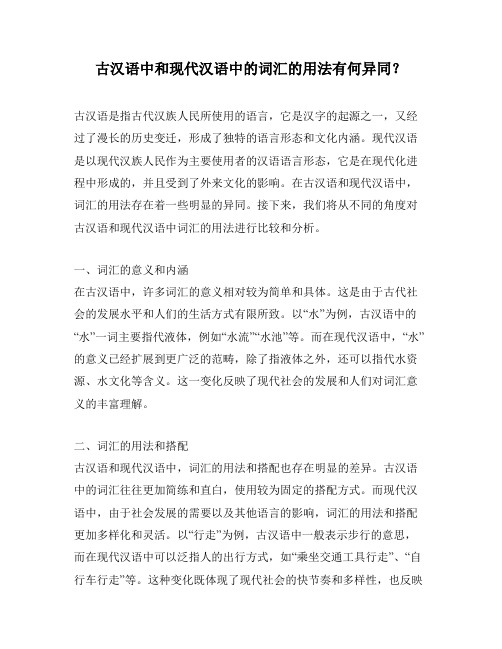
古汉语中和现代汉语中的词汇的用法有何异同?古汉语是指古代汉族人民所使用的语言,它是汉字的起源之一,又经过了漫长的历史变迁,形成了独特的语言形态和文化内涵。
现代汉语是以现代汉族人民作为主要使用者的汉语语言形态,它是在现代化进程中形成的,并且受到了外来文化的影响。
在古汉语和现代汉语中,词汇的用法存在着一些明显的异同。
接下来,我们将从不同的角度对古汉语和现代汉语中词汇的用法进行比较和分析。
一、词汇的意义和内涵在古汉语中,许多词汇的意义相对较为简单和具体。
这是由于古代社会的发展水平和人们的生活方式有限所致。
以“水”为例,古汉语中的“水”一词主要指代液体,例如“水流”“水池”等。
而在现代汉语中,“水”的意义已经扩展到更广泛的范畴,除了指液体之外,还可以指代水资源、水文化等含义。
这一变化反映了现代社会的发展和人们对词汇意义的丰富理解。
二、词汇的用法和搭配古汉语和现代汉语中,词汇的用法和搭配也存在明显的差异。
古汉语中的词汇往往更加简练和直白,使用较为固定的搭配方式。
而现代汉语中,由于社会发展的需要以及其他语言的影响,词汇的用法和搭配更加多样化和灵活。
以“行走”为例,古汉语中一般表示步行的意思,而在现代汉语中可以泛指人的出行方式,如“乘坐交通工具行走”、“自行车行走”等。
这种变化既体现了现代社会的快节奏和多样性,也反映了人们对词汇用法的不断探索和创新。
三、词汇的词性和语法功能在古汉语和现代汉语中,词汇的词性和语法功能也有所不同。
古汉语中的许多词汇往往是单纯的名词或动词,而在现代汉语中,词类的界限相对模糊,一个词汇可以具备多种不同的词性和语法功能。
例如,“量子”这个词在古汉语中只能作为名词使用,表示微量或细微之意,而在现代汉语中,除了名词的含义外,还可以指代物理学中的基本粒子,可以作为名词、形容词或动词的用法来描述。
通过对古汉语和现代汉语中词汇用法的比较和分析,我们可以看到随着社会不断发展,人们对词汇的意义理解的丰富、用法和搭配的多样化、词性和语法功能的扩展。
词汇搭配和词汇意义

们 展 示 了 液体 向外 流 走 、 后 干 涸 的 意 象 图示 , 才外 流 和水 最 人 的 流 失 都有 由 内 向外 的特 点 。 形 象 生 动 , 于 理 解 。 易 ( ) o nn —o f e“ ie t— v ” 示 “ 早 九 点 上 3 T m i a ie t— v .nn —o f e 表 s i i 从 班 至 下 午 五点 的 白领 工 作 人 员 ” 。
( T ec u t o aigsr u ri— t i.sri” 人 2) h o nr n w fcn e o s an s an“tan 向 y i b r
关 键 词 : 外 汉语 对
词汇教学
词 汇搭 配
英 国语 言 学 家威 尔金 斯 曾说 过 : 有 语 法 , 没 人们 表 达 事 物 寥 寥 无 几 ; 有 词 汇 , 们无 法 表 达任 何 事 物 。 对外 语 学 习 者 没 人 而言 , 握 大 量 目的 语 词 汇是 一 项 主 要 任 务 。 分 掌 握 一 个 词 掌 充
.
l
意 义
词
汇
搭
配
和
词
汇
韩 卫 春
( 京信 息 职 业 技 术 学 院 外 国语 系 , 南 江苏 南 京 摘 要 : 外 汉语 词 汇 教 学 的 策略 和 方 法 对 学 习者 有 很 对 大 的 影 响 。教 授 词 汇 搭 配 和 搭 配 意 义 是 词 汇 教 学 的 一 种 常 见 的 方 法 。在 使 用 该 方 法 时 , 以 动 词搭 配 为 主 , 注 词 汇 搭 配 应 关
词语搭配与搭配技巧
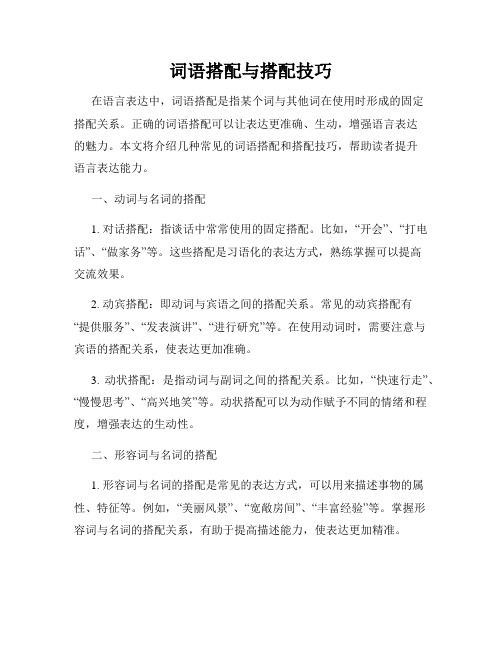
词语搭配与搭配技巧在语言表达中,词语搭配是指某个词与其他词在使用时形成的固定搭配关系。
正确的词语搭配可以让表达更准确、生动,增强语言表达的魅力。
本文将介绍几种常见的词语搭配和搭配技巧,帮助读者提升语言表达能力。
一、动词与名词的搭配1. 对话搭配:指谈话中常常使用的固定搭配。
比如,“开会”、“打电话”、“做家务”等。
这些搭配是习语化的表达方式,熟练掌握可以提高交流效果。
2. 动宾搭配:即动词与宾语之间的搭配关系。
常见的动宾搭配有“提供服务”、“发表演讲”、“进行研究”等。
在使用动词时,需要注意与宾语的搭配关系,使表达更加准确。
3. 动状搭配:是指动词与副词之间的搭配关系。
比如,“快速行走”、“慢慢思考”、“高兴地笑”等。
动状搭配可以为动作赋予不同的情绪和程度,增强表达的生动性。
二、形容词与名词的搭配1. 形容词与名词的搭配是常见的表达方式,可以用来描述事物的属性、特征等。
例如,“美丽风景”、“宽敞房间”、“丰富经验”等。
掌握形容词与名词的搭配关系,有助于提高描述能力,使表达更加精准。
2. 借助形容词修饰名词可以起到修饰和连接的作用。
比如,“困难但有挑战的任务”、“繁忙又充实的生活”等。
在使用形容词搭配时,要注意形容词与名词的逻辑关系,使表达更连贯、准确。
三、副词与动词的搭配1. 副词修饰动词可以起到强调动作方式、程度和时间的作用。
例如,“悄悄走动”、“高兴地唱歌”、“频繁地旅行”等。
在使用副词修饰动词时,需要注意副词与动词之间的一致性,使语言表达更加准确。
2. 部分副词具有否定的意义,与某些动词连用可以表达相反的含义。
比如,“不停思考”、“无意干扰”等。
熟练运用这种搭配关系可以准确表达自己的意思。
四、介词与名词的搭配介词是连接名词与其他成分的虚词,它与名词之间的搭配关系常用于表示时间、地点、原因、方式等。
常见的介词搭配有“在家工作”、“对...感兴趣”、“为了...而努力”等。
熟练运用介词与名词的搭配可以使表达更加清晰、准确。
词语的用法与意义
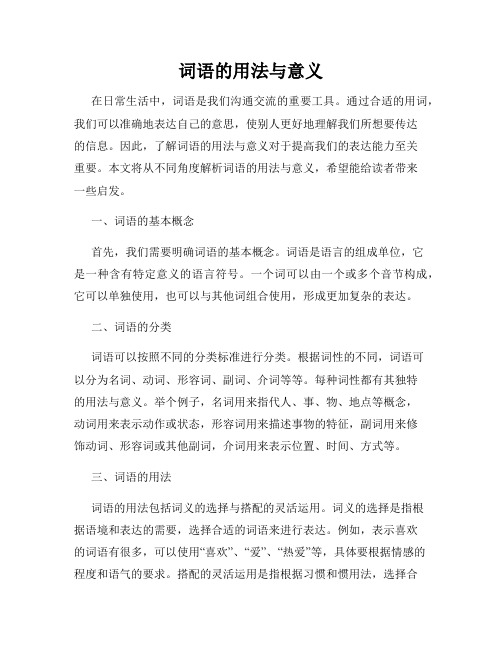
词语的用法与意义在日常生活中,词语是我们沟通交流的重要工具。
通过合适的用词,我们可以准确地表达自己的意思,使别人更好地理解我们所想要传达的信息。
因此,了解词语的用法与意义对于提高我们的表达能力至关重要。
本文将从不同角度解析词语的用法与意义,希望能给读者带来一些启发。
一、词语的基本概念首先,我们需要明确词语的基本概念。
词语是语言的组成单位,它是一种含有特定意义的语言符号。
一个词可以由一个或多个音节构成,它可以单独使用,也可以与其他词组合使用,形成更加复杂的表达。
二、词语的分类词语可以按照不同的分类标准进行分类。
根据词性的不同,词语可以分为名词、动词、形容词、副词、介词等等。
每种词性都有其独特的用法与意义。
举个例子,名词用来指代人、事、物、地点等概念,动词用来表示动作或状态,形容词用来描述事物的特征,副词用来修饰动词、形容词或其他副词,介词用来表示位置、时间、方式等。
三、词语的用法词语的用法包括词义的选择与搭配的灵活运用。
词义的选择是指根据语境和表达的需要,选择合适的词语来进行表达。
例如,表示喜欢的词语有很多,可以使用“喜欢”、“爱”、“热爱”等,具体要根据情感的程度和语气的要求。
搭配的灵活运用是指根据习惯和惯用法,选择合适的词语搭配来表达特定的意思。
例如,我们常说“好好学习,天天向上”,而不是“好好学习,天天往下”。
这种搭配的灵活运用使得我们的表达更加地道和自然。
四、词语的意义词语的意义是指词语所代表的事物、概念或动作的含义。
不同的词语可能具有相似的意义,但也有细微的差别。
例如,我们可以用“食物”来表示任何可以供人食用的东西,但如果我们用“美食”来表示,就更加强调食物的美味和独特性。
因此,了解词语的意义能够帮助我们更准确地选择合适的词语来进行表达。
五、词语的拓展与升华词语的用法与意义是不断发展变化的。
随着社会的发展和思维方式的改变,新词汇的产生和词语的含义的拓展与升华已成为常态。
例如,随着科技的进步,我们不再使用传统的电话,而是使用手机进行通信。
深入理解词语搭配

深入理解词语搭配词语搭配是语文学习中非常重要的一部分,它关乎着我们语言表达的准确性和流畅性。
在这篇文章中,我将以教育内容创作者的角色,为小学语文老师或中学语文老师撰写一份课件教案,帮助学生深入理解词语搭配。
一、引言词语搭配是指在语言表达中,两个或多个词语之间的固定搭配关系。
正确的词语搭配能够使我们的表达更加准确、地道,而不恰当的搭配则可能导致语言表达的不准确甚至误导他人。
因此,深入理解词语搭配对于提高语文水平至关重要。
二、常见的词语搭配1. 动词与名词的搭配动词与名词的搭配是最常见的一种词语搭配。
例如:“提出建议”、“发表演讲”等。
在这种搭配中,动词和名词之间的关系是固定的,我们需要掌握这些固定搭配的意义和用法。
2. 形容词与名词的搭配形容词与名词的搭配也是非常常见的一种词语搭配。
例如:“美丽风景”、“丰富知识”等。
在这种搭配中,形容词修饰名词,起到描述和限定的作用。
学生需要学会运用不同的形容词来描述不同的名词,使语言更加生动有趣。
3. 副词与动词的搭配副词与动词的搭配也是我们常见的词语搭配之一。
例如:“慢慢走”、“认真学习”等。
在这种搭配中,副词修饰动词,表示动作的方式、程度或态度。
学生需要理解不同副词与动词搭配的含义,并能够正确运用。
三、词语搭配的意义和用法1. 提高语言表达的准确性正确的词语搭配能够使我们的语言表达更加准确。
例如,我们可以说:“雄伟的建筑”、“繁忙的街道”,这样的描述更能准确地表达我们的意思,使听者更好地理解我们的观点。
2. 增加语言表达的地道性正确的词语搭配能够使我们的语言表达更加地道。
例如,我们可以说:“热烈的掌声”、“深情的目光”,这样的表达更符合汉语的习惯,使我们的语言更加地道。
3. 提升语文水平的重要手段深入理解词语搭配是提升语文水平的重要手段之一。
通过学习和掌握不同的词语搭配,学生能够提高自己的语言表达能力,丰富自己的词汇量,使自己的语文水平得到提升。
四、词语搭配的练习方法1. 阅读经典文学作品阅读经典文学作品是深入理解词语搭配的有效方法之一。
英语词汇短语搭配与固定搭配
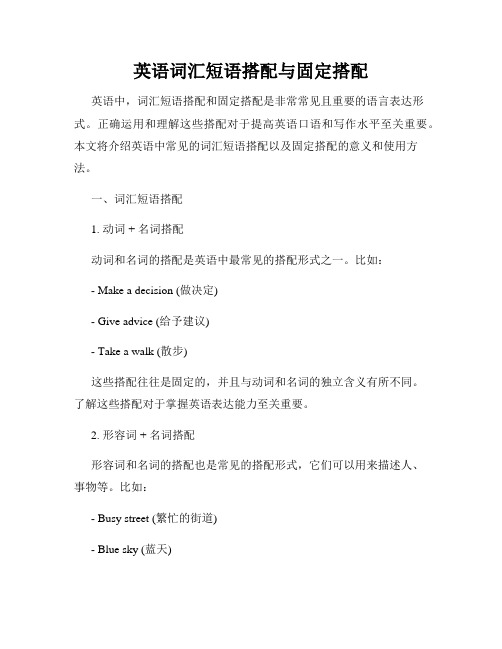
英语词汇短语搭配与固定搭配英语中,词汇短语搭配和固定搭配是非常常见且重要的语言表达形式。
正确运用和理解这些搭配对于提高英语口语和写作水平至关重要。
本文将介绍英语中常见的词汇短语搭配以及固定搭配的意义和使用方法。
一、词汇短语搭配1. 动词 + 名词搭配动词和名词的搭配是英语中最常见的搭配形式之一。
比如:- Make a decision (做决定)- Give advice (给予建议)- Take a walk (散步)这些搭配往往是固定的,并且与动词和名词的独立含义有所不同。
了解这些搭配对于掌握英语表达能力至关重要。
2. 形容词 + 名词搭配形容词和名词的搭配也是常见的搭配形式,它们可以用来描述人、事物等。
比如:- Busy street (繁忙的街道)- Blue sky (蓝天)这些搭配能够帮助我们更准确地描述所见所感,增强英语表达的表现力。
3. 动词 + 副词搭配动词和副词的搭配在英语中也非常常见,它们能够传达出动作的方式和程度。
比如:- Run quickly (快速跑)- Speak fluently (流利地说)掌握这些搭配能够使我们的语言更加生动有力。
二、固定搭配除了词汇短语搭配,英语中还存在着大量的固定搭配。
这些固定搭配往往是特定意义下固定的短语,不能随意更改其中的词序或替换其中的单词。
1. 表示时间的固定搭配在英语中,表示时间的固定搭配非常常见。
比如:- In the morning (在早晨)- On the weekend (在周末)- At night (在夜晚)这些固定搭配在描述时间时非常常用,并且经常出现在口语和书面语中。
2. 表示行为的固定搭配英语中也有许多表示行为的固定搭配。
比如:- Make a phone call (打电话)- Take a shower (洗澡)- Have a meal (吃饭)这些固定搭配使得我们在交流中能够准确表达自己的意思。
3. 表示感情、态度或思维的固定搭配英语中也有很多固定搭配用来描述感情、态度或思维。
英语词汇学习中的固定搭配有哪些重要性
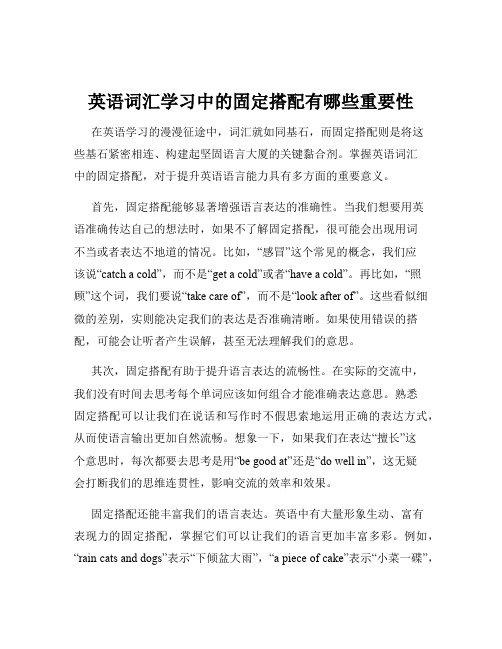
英语词汇学习中的固定搭配有哪些重要性在英语学习的漫漫征途中,词汇就如同基石,而固定搭配则是将这些基石紧密相连、构建起坚固语言大厦的关键黏合剂。
掌握英语词汇中的固定搭配,对于提升英语语言能力具有多方面的重要意义。
首先,固定搭配能够显著增强语言表达的准确性。
当我们想要用英语准确传达自己的想法时,如果不了解固定搭配,很可能会出现用词不当或者表达不地道的情况。
比如,“感冒”这个常见的概念,我们应该说“catch a cold”,而不是“get a cold”或者“have a cold”。
再比如,“照顾”这个词,我们要说“take care of”,而不是“look after of”。
这些看似细微的差别,实则能决定我们的表达是否准确清晰。
如果使用错误的搭配,可能会让听者产生误解,甚至无法理解我们的意思。
其次,固定搭配有助于提升语言表达的流畅性。
在实际的交流中,我们没有时间去思考每个单词应该如何组合才能准确表达意思。
熟悉固定搭配可以让我们在说话和写作时不假思索地运用正确的表达方式,从而使语言输出更加自然流畅。
想象一下,如果我们在表达“擅长”这个意思时,每次都要去思考是用“be good at”还是“do well in”,这无疑会打断我们的思维连贯性,影响交流的效率和效果。
固定搭配还能丰富我们的语言表达。
英语中有大量形象生动、富有表现力的固定搭配,掌握它们可以让我们的语言更加丰富多彩。
例如,“rain cats and dogs”表示“下倾盆大雨”,“a piece of cake”表示“小菜一碟”,“see eye to eye”表示“意见一致”。
这些固定搭配不仅增添了语言的趣味性,还能使我们在表达时更加生动形象,给人留下深刻的印象。
从应试的角度来看,固定搭配在各类英语考试中占据着重要的地位。
无论是听力、阅读、写作还是翻译,固定搭配都频繁出现。
在阅读理解中,正确理解文中的固定搭配对于把握文章的主旨和细节至关重要。
英语词汇的搭配意义所影射的性别歧视
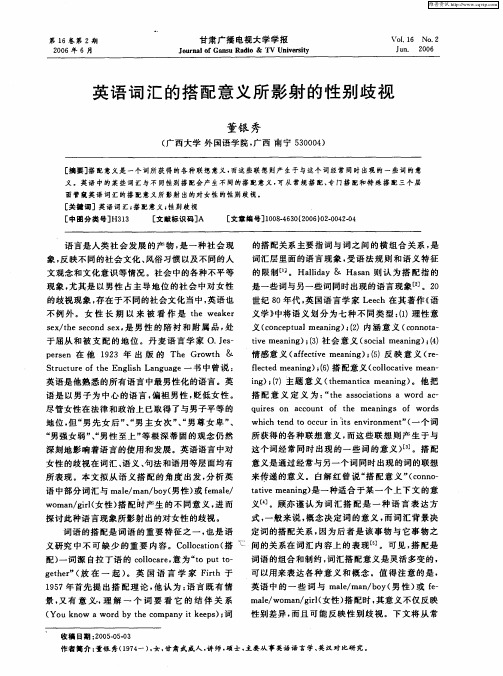
文观念 和文化 意识 等情 况 。社会 中的各种不 平等
现象, 尤其 是 以男 性 占主 导地 位 的社 会 中对 女 性 的歧视 现象 , 存在 于不 同的社 会文化 当中 , 英语 也 不 例 外 。女 性 长 期 以 来 被 看 作 是 t ewe k r h 所 影 射 的 性 别 歧 视
董银 秀
( 广西大 学 外 国语学 院 , 广西 南 宁 5 0 0 ) 3 0 4
[ 要 ] 配 意 义 是 一 个 词所 获得 的各 种 联 想 意 义 . 摘 搭 而这 些联 想 则 产 生 于 与这 个 词 经常 同 时 出现 的 一 些 词 的 意 义 。 英 语 中的 某 些 词 汇 与不 同性 别 搭 配 会产 生不 同 的搭 配 意义 , 从 常 规 搭 配 、 门 搭 配 和 特 殊 搭 配 三 个 层 可 专 面 管 窥 英 语 词 汇 的 搭 配 意 义所 影 射 出 的对 女 性 的 性别 歧 视 。 [ 键 词 ]英 语词 汇 ; 配 意 义 ; 别 歧 视 关 搭 性
所获 得 的各 种联 想 意义 , 而这 些联 想 则 产 生 于 与 这个 词经 常 同时 出现 的一 些 词 的意 义 )3。搭 配 [ ] 意义 是通过 经常与 另一个 词 同时 出现 的词 的联想
所 表现 。本 文拟 从 语 义搭 配 的 角度 出发 , 分析 英
语 中部 分词 汇与 maema / o ( 性) fmae l / n b y男 或 e l/
搭 配 意 义 定 义 为 : te as c t n r c “ h so i i sa wod a- ao
q ie n c o n o t e u r s o a c u t f h me n n s f a i g o wo d rs
词语搭配培养正确的词语搭配习惯

词语搭配培养正确的词语搭配习惯词语搭配是指词汇之间相互联系、搭配使用的规范,正确的词语搭配可以使表达更加准确、流畅,帮助我们更好地交流和表达思想。
而培养正确的词语搭配习惯,则是需要我们要通过长期的积累和实践,以及对语境和语法的敏感度来达到的。
本文将探讨词语搭配的重要性,并提供一些实用的方法来培养正确的词语搭配习惯。
一、词语搭配的重要性词语搭配在语言表达中起着至关重要的作用。
正确的词语搭配可以使表达更加准确,避免歧义;可以使句子更加通顺,增加语言的连贯性;可以提高文章的表达能力,使文章更具有说服力和读者吸引力。
例如,在描述天气时,我们常常使用“heavy rain”(大雨)、“strong wind”(大风)、“bright sunshine”(明媚阳光)等搭配,这样能够准确地传达出特定天气状况,帮助读者形象地理解并共鸣。
二、培养正确的词语搭配习惯的方法1. 大量阅读阅读是培养正确词语搭配习惯的有效手段。
通过阅读可以接触到丰富多样的词语搭配,帮助我们在语言表达中灵活运用。
可以选择各类优秀的文学、散文、学术论文等进行阅读,每天坚持一定的阅读时间,培养对词语搭配的敏感度。
2. 记忆搭配词组我们可以通过记忆一些常见的词语搭配词组来增加词汇量和灵活度。
例如,“strong coffee”(浓咖啡)、“take a shower”(洗淋浴)、“make a decision”(做决定)等词组都是在日常使用中频繁出现的。
将这些常见的词组记忆下来,通过不断的实践来巩固记忆,以便在需要的时候能够准确地运用。
3. 学习词汇搭配的语法规则语法规则对于正确的词语搭配至关重要。
学习和了解不同词类之间的搭配规则,可以帮助我们更好地理解和运用词语搭配。
例如,动词和介词的搭配关系,形容词和名词的搭配,等等。
通过系统地学习和练习这些规则,我们能够更加准确地使用词语搭配,表达自己的思想。
4. 多加实践实践是培养正确词语搭配的关键。
词语的意义和搭配
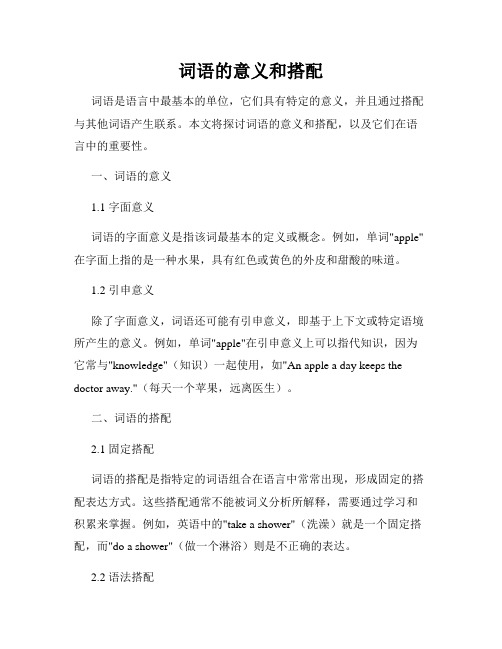
词语的意义和搭配词语是语言中最基本的单位,它们具有特定的意义,并且通过搭配与其他词语产生联系。
本文将探讨词语的意义和搭配,以及它们在语言中的重要性。
一、词语的意义1.1 字面意义词语的字面意义是指该词最基本的定义或概念。
例如,单词"apple"在字面上指的是一种水果,具有红色或黄色的外皮和甜酸的味道。
1.2 引申意义除了字面意义,词语还可能有引申意义,即基于上下文或特定语境所产生的意义。
例如,单词"apple"在引申意义上可以指代知识,因为它常与"knowledge"(知识)一起使用,如"An apple a day keeps the doctor away."(每天一个苹果,远离医生)。
二、词语的搭配2.1 固定搭配词语的搭配是指特定的词语组合在语言中常常出现,形成固定的搭配表达方式。
这些搭配通常不能被词义分析所解释,需要通过学习和积累来掌握。
例如,英语中的"take a shower"(洗澡)就是一个固定搭配,而"do a shower"(做一个淋浴)则是不正确的表达。
2.2 语法搭配词语的搭配还包括与其他词语在语法上的配合。
不同的词语要求特定的搭配结构和语法规则。
例如,动词"like"(喜欢)通常需要与"to"引导的不定式搭配使用,如"I like to play football."(我喜欢踢足球)。
三、词语意义和搭配的重要性3.1 表达清晰词语的意义和搭配的正确运用能够使语言表达更加清晰明了。
准确使用词语的意义可以避免产生歧义或误解。
恰当的词语搭配能够使表达更加流畅自然,增强语言的逻辑性和连贯性。
3.2 文章连贯性在写作中,正确运用词语的意义和搭配可以提高文章的连贯性。
通过合理运用词语的搭配,可以使文章的每个段落和句子之间有机地连接在一起,避免表达杂乱无章的情况。
搭配意义语言学

搭配意义语言学
意义和搭配对于语言教学的重要性不言而喻,在外语教学过程中,二者的关系是语言学术研究的热点之一。
主要探讨了搭配的定义和分类,深入解析了搭配和意义之间的关系以及对于英语词汇教学的启示。
关键词:搭配;意义;英语词汇教学一、综述语言是形式与意义的结合体,形式指的是拼写和发音、交流的媒介,而意义是指形式所代表的内容或实质。
在交流的时候,人们总是把几个词组合在一起形成短语或句子,这种组合不是随随便便的,也有“偏好”。
语言学家Firth就把这种“偏好”命名为“搭配”。
中国英语学习者在搭配习得过程中遇到很多问题,引起了英语教学者的高度关注。
研究表明,搭配错误在中国英语学习者所犯的错误中占很大的比重,原因之一就是母语迁移,输出了很多被西方学者称为“中式英语”的表达,例如,很多学习者认为“red-eyed”是英语中用来描述“红眼病”的表达,但事实上却是“green-eyed”。
这种现象在英语学习初期很常见,由于输入不多,在遇到表达的瓶颈时会不自觉地求助母语。
句法学之父Chomsky在“最简方案”理论中提出“Lexicon-is-prime”的说法,也从侧面反映了语义学的重要性。
英语词语搭配的语义分析
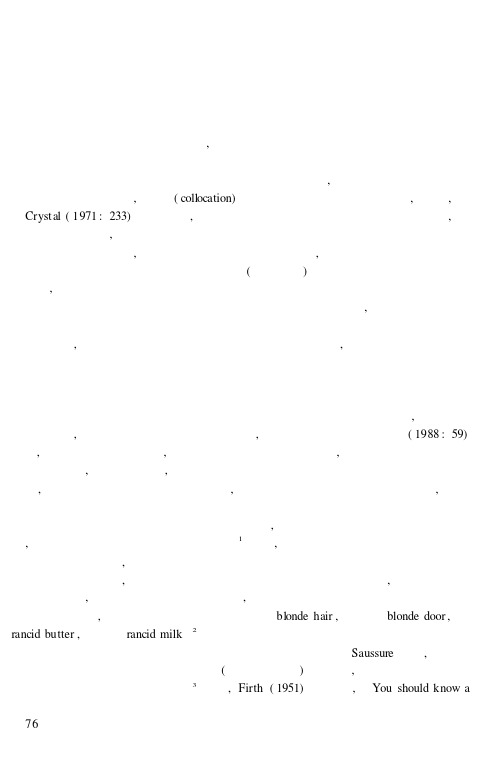
英语词语搭配的语义分析吴潜龙语言之所以具有无穷尽的表达力,是因为它本身丰富的词汇和词语之间的搭配。
这些搭配可以用来表达各种意义和概念。
词语搭配为一种语言提供了形象、生动及准确的表达法,也为研究一种语言提供了大量的材料。
长期以来,搭配(collocation)是语义学研究的一个重要方面,但是,正如Crystal(1971:233)所指出的,语义学理论还有许多问题没有得到充分的解决,如怎样分析一词多义,怎样得出关于惯用语的准确定义、怎样决定哪些内容应该包括在关于一个词的词义说明中,以及影响词义和用法的文体特点,等等。
对于词语搭配上一些常见现象的最简单说明就是“这是习惯上的(或常见的)用法。
”这种说明缺乏必要的说服力,更无法帮助中国学生理解搭配所表达的概念及其在话语中的作用。
本文试图从语义学的角度来分析一些这一类“习惯上的”用法,并对这一研究中的一些概念和方法作一些说明。
我们将以英语中形容词性修饰语与名词中心词的搭配中一些现象为例,说明这种搭配的可组合性、可说明性及可预测性,并通过对搭配的分析进一步探讨句子意义与言语的表达力之间的关系。
一、基本概念搭配是词的组合与制约。
搭配指的是一个词与另一个词一起使用的方式,这里涉及到两个方面,即一个词通常与哪些词一起使用,为什么这样使用。
王宗炎(1988:59)指出,“搭配指的是一种制约,即某个词要与哪个词用在一起,比如某个动词要与哪些名词用在一起,等等。
”因此,研究词的搭配就是观察某个词与另外一些词一起使用的现象,而人们之所以强调其中的制约一面,则是因为人们往往注重表达的正确性,因而总是要对搭配的限制作某种程度的说明。
搭配不是简单的词义组合。
许多学者都承认,搭配的词项之间存在着某种语义联系,因此语义分析是观察搭配的主要内容。
〔1〕比如,一个修饰语与其中心词之间通常都存在着语义上的联系,如说明中心词的颜色、形状、大小、性质、特征等等。
同时也存在着一定的逻辑关系,即人们认为是超越常规的搭配是不可能的。
词语搭配培养学生的词汇运用能力

词语搭配培养学生的词汇运用能力词汇是语言运用的基石,通过恰当的词语搭配可以使表达更加精确、准确。
培养学生的词汇运用能力是提高语言表达能力的重要一环。
本文将探讨如何通过词语搭配来培养学生的词汇运用能力。
一、词汇搭配的重要性词汇搭配是指在具体语境中,使用适当的词汇组合来表达思想或情感。
良好的词汇搭配能够增加表达的精确性和准确性,丰富语言表达形式,提升文章的质量。
因此,对于学生来说,培养词汇搭配能力具有重要意义。
二、培养学生词汇搭配的方法1. 掌握常用短语和固定搭配学生可以通过积累常用短语和固定搭配来提高词汇搭配能力。
例如,学生可以利用课余时间背诵常用的动词短语,如"go for"、"take part in"等,以及常见的形容词短语,如"good at"、"interested in"等。
通过反复运用这些短语,学生可以逐渐掌握正确的词汇搭配方式。
2. 拓展词汇搭配的语境为了帮助学生更好地掌握词汇搭配,教师可以设计一些与现实生活相关的情境和话题,让学生在实际应用中学习词汇搭配。
例如,通过讨论日常生活中的购物体验,学生可以学习到与购物相关的词汇搭配,如"buy online"、"window shopping"等。
3. 阅读和写作练习阅读是培养学生词汇搭配能力的重要途径之一。
教师可以鼓励学生多读一些词汇丰富的文章,通过阅读来提高学生的词汇搭配意识。
同时,教师还可以引导学生写作,让他们在写作过程中尝试不同的词汇搭配方式,以提高运用词汇的能力。
三、搭配错误的纠正方法学生在词汇搭配中难免会出现错误,正确的纠正方法可以帮助他们更好地改进。
以下是一些常见的搭配错误及纠正方式:1. 误将动词和介词搭配例如,学生常常会说"depend on with",而正确的搭配是"depend on"。
高级词汇的应用及搭配

高级词汇的应用及搭配词汇是语言的基础,而高级词汇则是丰富语言表达的关键。
在各个领域,无论是学术研究、商务交流还是文学创作,高级词汇的运用都能提升表达的深度和准确度。
本文将探讨高级词汇的应用及搭配,帮助读者提升自己的语言水平。
一、高级词汇的应用高级词汇通常具有更加精确的含义,能够更准确地表达思想和观点。
例如,我们可以用"exquisite"来形容一件精美的艺术品,而用"delicious"则更适合描述一道美味的食物。
另外,高级词汇还可以增强表达的感染力和说服力。
例如,我们可以用"devastating"来形容一场灾难的破坏力,而用"catastrophic"则更能凸显其严重性。
高级词汇的应用还可以提升文章的艺术性和文采。
通过使用富有诗意的词汇,我们可以给读者带来更丰富的阅读体验。
例如,用"serene"来形容一个宁静的湖泊,用"breathtaking"来形容壮丽的日落,都能够让读者产生强烈的视觉感受。
二、高级词汇的搭配高级词汇的搭配是运用它们的关键。
不同的高级词汇有着不同的搭配方式,只有正确地搭配才能发挥它们的优势。
以下是一些常见的高级词汇搭配示例:1. "profound" + "impact/effect/influence":表示深远的影响。
例如,"The invention of the Internet has had a profound impact on our daily lives."2. "essential" + "element/ingredient/part":表示必要的要素。
例如,"Good communication skills are essential to success in the workplace."3. "innovative" + "solution/approach/idea":表示创新的解决方案。
为什么要运用词语的正确搭配

为什么要运用词语的正確搭配为什么要运用词语的正确搭配词语是语言的基本单位,它们通过搭配形成了各种不同的词组、短语和句子。
词语的正确搭配是语言表达的基础,它直接影响着交流的准确性和流畅性。
在日常生活和各种专业领域中,正确搭配词语是非常重要的。
本文将探讨为什么要运用词语的正确搭配,并分析其重要性和影响。
1. 传递准确信息词语的正确搭配可以确保准确传递信息。
语言是人们交流思想和观点的工具,而词语的选择和搭配直接决定了信息的准确性。
如果词语搭配不当,可能会导致信息的失真甚至误导。
例如,在医学领域,使用错误的词语搭配可能导致误诊或误导患者,而在法律文件中,词语的正确搭配则可以确保法律条款的准确解读和执行。
2. 提升表达能力词语的正确搭配可以提升表达能力。
语言是思维的表达工具,而词语的选择和搭配可以直接反映出一个人的语言水平和思维能力。
正确搭配词语可以使表达更加准确、精确,让读者或听众更容易理解和接受。
相反,如果词语搭配不当,可能会产生歧义、模糊或晦涩的表达,降低交流的效果。
3. 增强语言的美感词语的正确搭配可以增强语言的美感。
语言不仅是一种工具,也是一种艺术。
正确搭配词语可以使表达更加优雅、流畅,让人们在阅读或听取时感受到语言的美妙之处。
相反,错误的词语搭配可能会破坏语言的美感,使表达显得拗口或不协调。
4. 避免语言上的尴尬词语的正确搭配可以避免语言上的尴尬。
在正式场合或与他人交流时,使用错误的词语搭配可能会给人留下不专业或不自信的印象,甚至引发误解或笑话。
通过正确搭配词语,可以避免这些尴尬和误解,建立良好的沟通和印象。
5. 提高专业素养在各个专业领域中,正确搭配词语是提高专业素养的重要方面。
不同的领域有着特定的词汇和术语,这些词语的正确搭配直接关系到专业知识的传递和理解。
在医学、法律、工程等领域,正确搭配词语可以体现出专业人士的专业素养和能力。
同时,正确使用领域内的术语也有助于提高交流的效率和准确性。
总结起来,词语的正确搭配在语言交流中起着至关重要的作用。
如何进行词汇运用的固定搭配和语境运用拓展
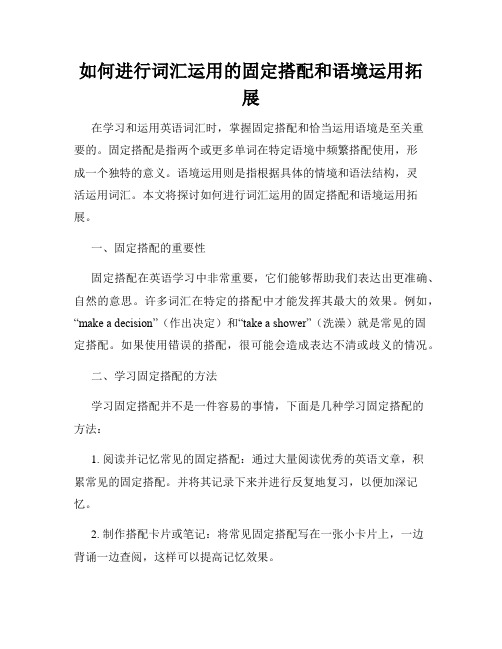
如何进行词汇运用的固定搭配和语境运用拓展在学习和运用英语词汇时,掌握固定搭配和恰当运用语境是至关重要的。
固定搭配是指两个或更多单词在特定语境中频繁搭配使用,形成一个独特的意义。
语境运用则是指根据具体的情境和语法结构,灵活运用词汇。
本文将探讨如何进行词汇运用的固定搭配和语境运用拓展。
一、固定搭配的重要性固定搭配在英语学习中非常重要,它们能够帮助我们表达出更准确、自然的意思。
许多词汇在特定的搭配中才能发挥其最大的效果。
例如,“make a decision”(作出决定)和“take a shower”(洗澡)就是常见的固定搭配。
如果使用错误的搭配,很可能会造成表达不清或歧义的情况。
二、学习固定搭配的方法学习固定搭配并不是一件容易的事情,下面是几种学习固定搭配的方法:1. 阅读并记忆常见的固定搭配:通过大量阅读优秀的英语文章,积累常见的固定搭配。
并将其记录下来并进行反复地复习,以便加深记忆。
2. 制作搭配卡片或笔记:将常见固定搭配写在一张小卡片上,一边背诵一边查阅,这样可以提高记忆效果。
3. 反复运用固定搭配:在写作或口语练习中努力使用固定搭配。
这有助于加深记忆,并培养形成正确表达的习惯。
三、语境运用的拓展除了固定搭配,恰当运用语境也是十分重要的。
学习者应该积极提升自己对语境运用的理解和运用能力。
1. 注意上下文中的词汇搭配:在学习和使用词汇时,要注意了解和记忆一些典型的搭配。
例如,“strong coffee”(浓咖啡)和“fast car”(快车)。
2. 理解句子结构和语法规则:在理解句子结构和语法规则的基础上,选择适当的词汇进行运用。
3. 学习和运用语境相关的短语:在特定的语境中,一些短语的使用能够更准确地表达出意思。
例如,在商务英语中,“I'm pleased to meet you”(很高兴见到您)比起一般的问候语更为恰当。
四、实践的重要性学习固定搭配和语境运用并不仅仅是记忆和理论的问题,实践也是至关重要的。
词语的用法和搭配

词语的用法和搭配词语的用法和搭配是语言学中的重要内容之一。
准确地使用词语并正确搭配可以使语言表达更加准确、生动且有魅力。
本文将探讨词语的用法和搭配的重要性,并提供一些实用的技巧和例子。
一、用法和搭配的意义词语的用法和搭配指的是一个词语在句子中的正确使用方式以及与其他词语的合适搭配。
准确使用词语和正确搭配可以使句子更加通顺、自然,使表达更加清晰、精确。
同时,正确的用法和搭配也可以增加语言的美感和表现力。
例如,动词的用法和搭配对于表达动作和状态至关重要。
一个动词的用法错误或搭配不当可能导致句子意思的曲解或混淆。
另外,形容词和副词的用法和搭配也对于描述和修饰词语起到关键作用。
使用恰当的形容词和副词可以让句子更加生动、具体,并且能够更准确地表达说话者的意思。
二、词语用法的技巧1. 阅读和记忆优秀的文学作品:阅读优秀的文学作品可以帮助我们学习和理解词语的正确用法和搭配。
通过阅读,我们可以模仿作者的精准表达和恰当搭配,逐渐提高自己的语言水平。
2. 学习词语的不同词性和含义:一个词语可能有不同的词性和含义。
了解词语的不同用法和搭配可以帮助我们更灵活地运用词汇,丰富我们的表达方式。
3. 注意上下文语境:词语的用法和搭配与语境密切相关。
我们需要注意句子的上下文,以确定词语的合适用法和搭配。
有时候,一个词语在不同的语境下使用时,意思和搭配会有所不同。
三、词语搭配的技巧1. 辨别和学习常见的词语搭配:不同的词语有不同的搭配习惯。
学习常见的词语搭配可以拓宽我们的词汇量,并且使我们的表达更具流畅性。
2. 学习固定搭配和习惯用法:许多词语会与其他词语固定搭配,形成常用的短语或习惯用法。
学习这些固定搭配和习惯用法可以使我们的表达更加地道、自然。
3. 注意词语之间的逻辑关系:在选择词语搭配时,我们需要注意词语之间的逻辑关系。
正确的词语搭配可以使句子的逻辑更加清晰和连贯。
四、例子和应用为了更好地理解用法和搭配的重要性,我们来看几个例子。
- 1、下载文档前请自行甄别文档内容的完整性,平台不提供额外的编辑、内容补充、找答案等附加服务。
- 2、"仅部分预览"的文档,不可在线预览部分如存在完整性等问题,可反馈申请退款(可完整预览的文档不适用该条件!)。
- 3、如文档侵犯您的权益,请联系客服反馈,我们会尽快为您处理(人工客服工作时间:9:00-18:30)。
Collocative Meaning of Words
Language is a combination of form and meaning of words. The form plays a role as media
of spelling, pronunciation and communication while the meaning is the content of the form. A linguist, Firth, was the first person who proposed the conception of “collocative meaning”. Geoffrey N. Leech had proposed seven rules of semantics which include conceptual meaning, connotative meaning, social meaning, affective meaning, reflective meaning, collocative meaninga and thematic meaning. And the brief introduction of collocative meaning as follow: The collocative meaning of words is on the basis of the association of combining words which refer to different meanings. The meaning of words needs to be connected with the combination of phrases, which means that part of the phrase’s meaning is designed by the connecting words.
Most synonyms have same meanings with different potential combinations. Take an instance, the meaning of “pretty” is the same with “handsome” but it has personal collocations. Like “pretty” could be arranged with words as “girl”, “lady”, “woman”, “flower”, “garden”, “colour” or “village” while “handsome” should be collocated with words as “boy”, “man”, “car”, “vessel”, “overcoat”, ”palace” or “airliner”.
Words have its collocative rules. There are four limitations in the connection between phrases. Firstly, the meaning of words is totally decided by the way and the logic of collocation. For instance, we have a sentence as “he was justly proud”, but we would not use a sentence as “he was justly arrogant”. Secondly, the meaning of words is decided by the scale of collocation, which means a phrase can match with a group of words which have common meaning and could be used in other forms. As an example, there is a sentence as “the baby tiger died”, and the phrase “died”here cannot be replaced by the phrases “passed away”. Thirdly, set phrase, which means the meaning of words isn’t designed by the logic or the scale of the collocation, is accepted as a fixed expression by people. For example, “rancid”, “bacon” and “butter” have equivalent combination, “addled”, “brain” and “eggs” could be used in similar expression. Last, the match of words is unreasonable, which with illogical collocative meaning, but accepted as a usual practice. For example, “to cry one’s eyes out” means deep cry, “to have one’s heart in one’s month” means very surprise.
Collocation of words is a language phenomenon. Language is deeply occurred by the ethnic culture; therefore different nations have diverse methods in recognizing and describing the world. On the basis of these, words have different collocation. Just as an example, a Chinese phrase “看”has several equivalent expression in English as “read”, “watch”, “look ”, “see” and so on. When we speak Chinese “看报”,the equal phrases we used in English is “read newspaper” but not “see newspaper” or “watch newspaper”. We used “watch” in combination “watch TV” or “watch movie” and “see” in “see you”.。
